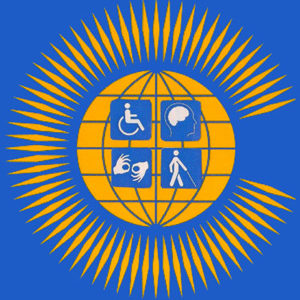9th to 13th March 2025
New Delhi
The Commonwealth Disabled People’s Forum (CDPF) successfully hosted a five-day Training the Trainers & Development Programme in India, bringing together disability rights leaders and advocates from across the region.
Participation
- 5 representatives from Sri Lanka
- 2 from the Maldives
- 19 participants from across India
Unfortunately, due to visa issues, no participants from Pakistan or Bangladesh were able to attend this time.
Highlights of the Programme
The training focused on strengthening leadership, advocacy, and capacity-building for disability rights, aligned with the UN Convention on the Rights of Persons with Disabilities (UNCRPD).
Key sessions included:
- Paradigm Shift in Disability – history of the disability movement in India and globally, the language we use, and tackling traditional barriers.
- Inclusive Education (Article 24) – designing inclusive schools, addressing segregation vs. inclusion, and role-play advocacy with officials.
- Employment & Livelihood (Articles 27 & 28) – engaging employers, building campaigns with youth, and addressing barriers to equal work opportunities.
- Disability & Health Services (Article 25) – case studies and access to quality health care.
- Guardianship and Supported Decision-Making (Article 12) – implications for mental health and legal systems.
- Media, Representation & Awareness (Article 8) – challenging stereotypes and influencing mainstream narratives.
- Gender Equality in the Disability Movement – empowering women leaders.
- Using the UNCRPD and SDGs for Advocacy – building strategies to influence government policy and public awareness.
The course concluded with participant reflections, evaluation, and certificate presentations.
Trainers
The programme was led by a diverse team of international and regional trainers:
Richard Rieser (RR)
Sarah Kamau (SK)
Diethono Nahkro (DN)
Sruti Mohapatra (SM)
Arman Ali (AA)
Nancy Maguire (NM)
Education
Participants discussed how inaccessible schools, lack of assistive devices, and family attitudes hold disabled children back.
Outcome: Agreement on the urgent need for inclusive schools, trained teachers, and equal access to learning.
Quote: “Families are very influential – they can either open or close the door to education.”
Employment
Disabled people continue to face discrimination, unequal pay, and limited workplace adjustments.
Outcome: The group developed ideas to expand opportunities through inclusive hiring, entrepreneurship, and fair workplace policies.
Quote: “Financial independence is harder to achieve because of discrimination, we are denied opportunities, fair pay, and even access to loans to start our own businesses.”
Politics
Disabled people are too often excluded from mainstream politics and decision-making.
Outcome: Strong calls were made for voter education, grassroots organising, and greater representation in political parties.
Quote: “We want strong representation so we eventually have someone who will do something for us.”
Women
Discussions revealed how disabled women often face stereotypes, lack of privacy, and barriers in healthcare, family life, and relationships.
Outcome: A commitment to challenge these attitudes and ensure disabled women’s rights are fully respected.
Quote: “Doctors sometimes advise sterilisation or abortion without consent — disabled women must have the right to make their own healthcare decisions.”
Find below the course book and an analysis of the programme.
